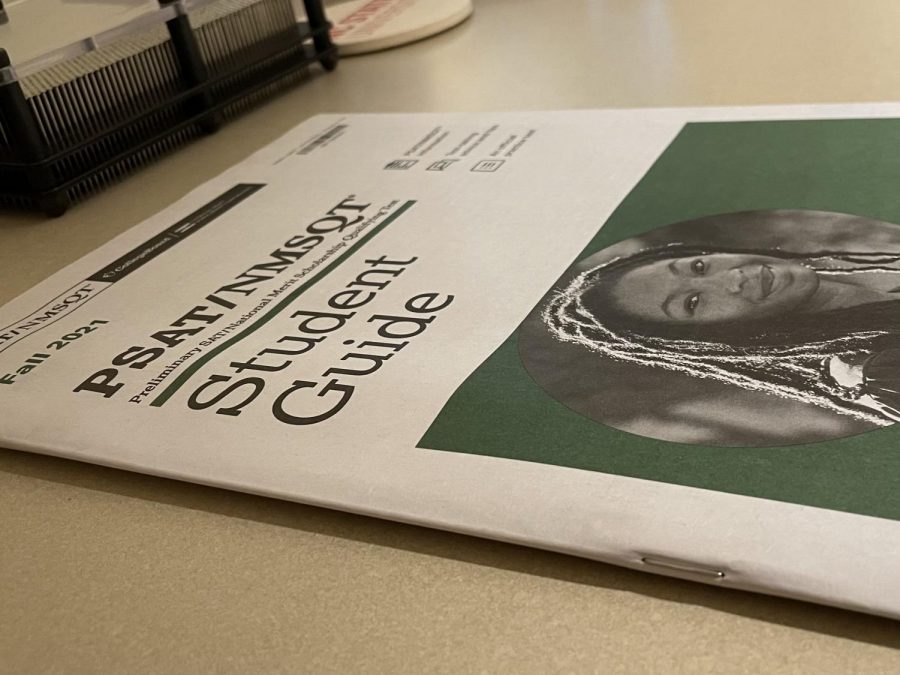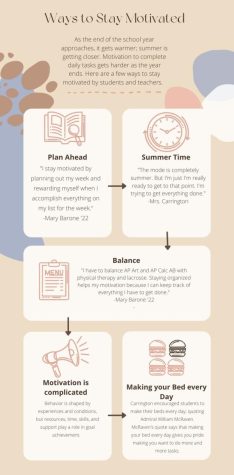Test Optional Policies Question Future of Standardized Testing
The PSAT Student Guide walks test-taker through the exam process. PSAT prep books and other testing resources can be found in the Guidance Office.
Following the unpredictable outbreak, quarantine, and closures caused by COVID in 2020, many universities changed their testing policies. College test optional policies formed during the COVID era leave the future of standardized testing for college applicants uncertain. The increasingly popular test optional approach has caused current and future college applicants to question the purpose of taking standardized tests such as the PSAT and SAT.
The Benefits of the Test Optional Policy
Mr. Lang, a Padua guidance counselor of 9 years, has witnessed standardized testing requirements vary from year to year. However, he has noticed an emerging trend of schools giving students the choice of submitting scores.
“Testing has definitely decreased in necessity, meaning an increasing number of schools each year have gone test optional, which means they don’t need test scores for an application,” Lang said. “Then when COVID hit, essentially every college in the nation went test optional. So right now a large majority of schools are still test optional, which is a good thing.”
Lang views test optional policies to be beneficial to modern applicants for a wide range of reasons, one being the alleviation of stress surrounding the scheduling of standardized tests. CDC guidelines limited spots on test days due to restricted seating in classrooms.
“So not only did test centers close, the test centers that were open were now restricting how many students could test,” Lang said. “It brought to light the idea that testing was not convenient.”
Those with a lack of resources or transportation felt the inconvenience of standardized testing the most. Lang pointed out the economic disadvantage of required standardized test scores posed on applicants.
“That had always been a problem: Under-resourced students, students from lower socioeconomic standing, didn’t have as many opportunities to test [but] COVID emphasized that,” Lang said. “Test centers were closing and there were stories about kids traveling two to three hours just to take a test.”
Test optional policies also help relieve some of this stress associated with submitting standardized test scores. Lang explained that test optional policies allow guidance counselors to help applicants decide whether or not to submit their scores depending on what is most advantageous to them.
“We advise them based on their success on the standardized test in comparison to what the college is looking for,” he said. “[For] students who do test well, it’s another way to demonstrate how strong of a student they are. Schools going test optional is a very good thing. Hopefully it will alleviate some of the stress involved with applying to college.”
Ashlanda Bannerman, a senior, has taken the SAT a total of four times trying to achieve her target score. Outside of PSAT tests, Bannerman used a wide range of preparation sources to try to accomplish the scores she wanted to submit for her colleges. However she feels that the process of taking and retaking the test was “not worth it” because of how “mentally straining” it was.
“I feel like everybody has their certain reasonings of why they didn’t do the best because some people stress out,” she said. “I [know I] stressed out a lot.”
The Pitfalls of the Test Optional Policy
On Wednesday, October 13, sophomores and juniors throughout the country took the PSAT. For Rachel Smookler, a junior, it was her second time taking the PSATs. While she said her confidence has improved with every exam, recent test optional policies have ultimately affected her motivation.
“It’s definitely hard to get motivated to do tutoring and test prep because it feels optional,” Smookler said. “When I went into the PSAT on Wednesday, I was just like, ‘Oh it’s just another thing I have to get over and done with.’ ”
Lang voiced concern over students like Smookler taking standardized tests less seriously causing an issue with their ability to take major tests later in life. For students who plan on going through college, and eventually medical school or law school, Lang said these tests “are not going away.”
“Students need to be ready for the stress and the environment of a major test because they’re going to do that all the way through their formal education,” he said.
Misrepresentation in Standardized Testing
Smookler expressed that the open minded perspective of test optional policies allows for students who struggle with standardized testing to be portrayed more truthfully.
“I don’t think it accurately represents everyone, ” Smookler said. “I think if [you] work hard in school, you should get credit for it and not be penalized if you’re not a good test taker.”
Bannerman’s personal experience with testing especially affected her viewpoint of standardized test scores misrepresenting a student’s academic performance.
“When it comes to a timed test, it really affects how people think. I know when I’m taking a test and you add a timer, all of a sudden my heart starts beating, I start getting scared, and then I look at the time more than I’m thinking,” Bannerman said.
She believes the best thing for the future of standardized tests is to just “throw it out”.
“I feel like we need to open the spectrum and understand certain people’s living or testing experience[s],” she said. “We should be open to whatever somebody has going on because everybody studies differently. Everybody focuses in school differently and I feel like that’s something that we should know, that everybody is different.”
Bannerman thinks that the personal essay should become the main deciding factor in the college admissions process.
“I feel like that’s why you have the essay, because you can explain okay I’m not the best, but this is me as a person,” she said, “and I feel like there are some people who have straight A’s, but they’re not the best people, versus a person who probably doesn’t have the best scores, and is an amazing person who works for what they believe in.”
While standardized testing may be intended to measure the “standard” student’s ability, today’s college applicants include those of all different socioeconomic backgrounds and intellect. However, the true future of standardized testing still remains unknown. Lang hopes to see the trend of test optional policies spread nationwide.
“The future of standardized testing at this point looks bleak,” Lang said. “Most schools remain test optional after COVID. Some schools have returned to requiring test scores…. Hopefully, we will continue to see this trend where schools are giving students the option.”

Maggie is a senior at Padua Academy. She took Journalism to continue to take advantage of Padua’s media classes, she has been involved in PATV and the...







